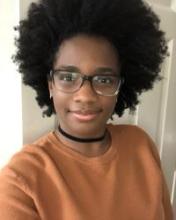Interviewed by Professor Jess Werk
In February, I connected with Bethlee Lindor, an NSF Graduate Research Fellow and Ph.D. candidate in the Department of Astronomy, to spotlight her research and experiences. Born in Port-au-Prince, Haïti, and raised in the Northeast U.S., Bethlee now applies her mathematical talents to innovative approaches in planetary system detection and characterization. Working with Professor Eric Agol, she's developing analytical models that treat our solar system as if it were a distant exoplanetary system—a creative reversal that provides fresh insights into both fields. Between advancing our understanding of planetary dynamics and finding moments to enjoy the Pacific Northwest's intermittent sunshine, Bethlee represents the next generation of astronomers challenging conventional approaches to planetary science.
Q: What moment in your academic journey first sparked your interest in astrophysics?
"Well, I've always been interested in science. I remember when I was in middle school, I was part of this program where we would go to a local university and take an advanced biology class. I feel like scientific investigation methods and doing cool experiments pulled me in. Then once I was in high school, I had to think about what kind of science I wanted to pursue at the college level. And that's where I was really stuck between genomic biology and Astronomy.
Eventually though I decided against biology just because I hated chemistry and dreaded having to take organic chemistry in college. I felt like astronomy was a field that would always be interesting and there were seemingly constant discoveries being made (especially in the exoplanetary field). It was also during this time that I started watching the follow up to the Cosmos TV show, so I guess, thanks Carl Sagan."
Q: What inspired your innovative approach to apply methods typically used for exoplanet detection to our solar system?
"I remember Eric, my advisor, telling me about this project that he had started with a former student: They were simulating what effects the Sun's stellar noise had on retrieved planetary parameters to inform missions like Plato. Anyway, disaster struck when his laptop crashed, and Eric lost maybe a year of research. But as devastating as that was for him, it opened the door for me to explore the possibilities if stellar noise was not an issue. Having external funding through a graduate fellowship was huge plus!"
Q: How has working with Professor Agol influenced your approach to scientific investigation?
"Eric and I are very similar types of people: he likes to explain maths; I like to listen to maths being explained. [laugh] After the computer crash, Eric also started using the language Julia and has adapted to using Julia for everything. So, I have also spent the time learning this new programming language, and how to develop software for open-source use."
Q: How has studying our solar system as an exo-system changed your perspective on exoplanet detection?
"Well, it's shown me that our solar neighborhood is very special. On top of that, we're decades away finding a system that even closely resembles ours."
Q: What research accomplishments from the last year represent significant milestones in your doctoral work?
"Aside from submitting my second paper for publication, completing my general exam was a huge milestone! That week was quite possibly one of the worst weeks of my life. The amount of "how much I think I know about pebble accretion" went from a little, to a solid amount, to a lot more than expected in the time frame, then back to a little. There came a point when my brain just couldn't absorb any more information. "
Q: What aspect of UW astronomy community has most enriched your graduate school experience?
"I've found some of the most caring, supportive, smart, and respectful individuals in my graduate peers. When I need to get away from my work, or a different perspective, there are certain people who I can always count on. I think it's very easy for me to fall into a self made 'isolated investigator' trap, and I'm very grateful to the other students."
Q: Where in Seattle do you go to clear your mind?
"I like going to Woodland Park and walking amongst the trees. If I'm more limited for time, then a brief walk to the Seafab café while listening to music."
